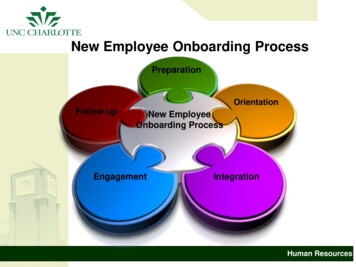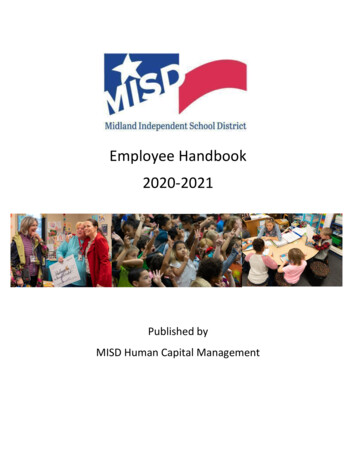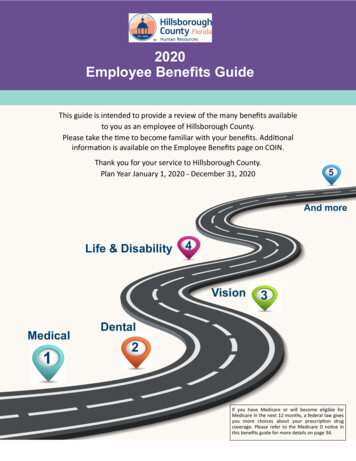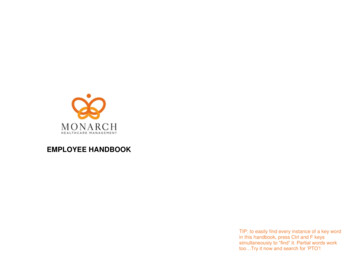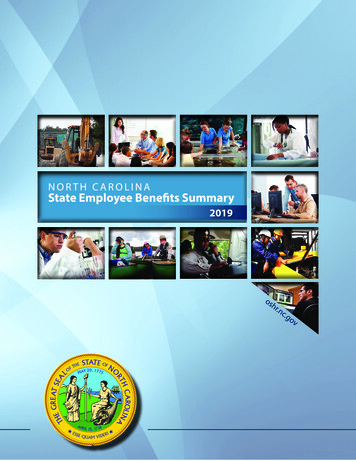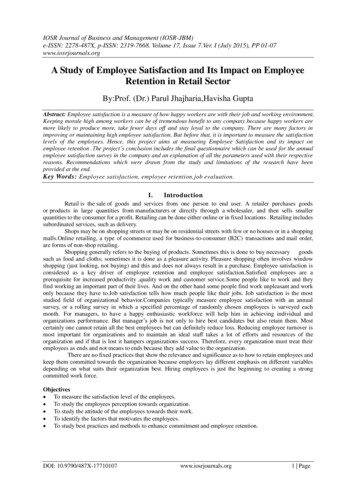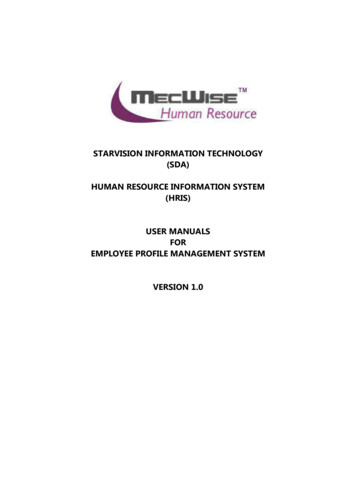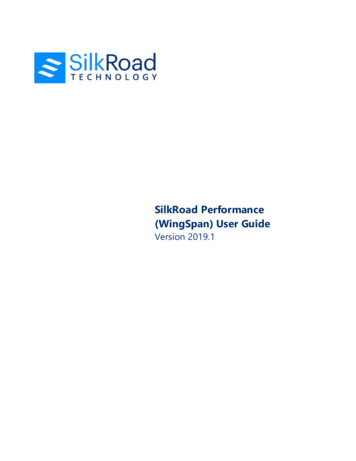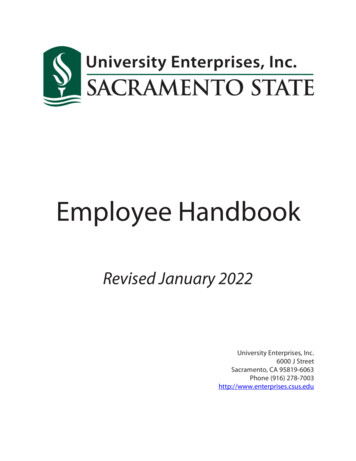
Transcription
Employee HandbookRevised January 2022University Enterprises, Inc.6000 J StreetSacramento, CA 95819-6063Phone (916) 278-7003http://www.enterprises.csus.edu
A MESSAGE FROM THE EXECUTIVE DIRECTORAT-WILL EMPLOYMENTEMPLOYMENT CATEGORIES . 1-1NONEXEMPT . 1-1EXEMPT . 1-1FULL-TIME . 1-1PART-TIME. 1-1HOURLY . 1-1SALARIED . 1-2NEGOTIATED . 1-2TEMPORARY . 1-2CASUAL . 1-2STUDENT ASSISTANTS . 1-210/12 OR ACADEMIC YEAR . 1-2REGULAR . 1-2PROBATIONARY . 1-3COMPENSATION . 2-1SALARY PROGRAM ADMINISTRATION – REGULAR EMPLOYEES . 2-1HOURS OF WORK AND PAY DAYS . 2-2TIMEKEEPING . 2-2GARNISHMENT . 2-3OVERTIME FOR NONEXEMPT EMPLOYEES . 2-3LACTATION ACCOMMODATION . 2-3BENEFITS . 3-1HEALTH AND WELFARE BENEFITS . 3-1HEALTH AND DENTAL COVERAGE CONTINUATION – (COBRA AND HIPAA) . 3-1RETIREMENT BENEFITS – CALPERS . 3-2RETIREMENT BENEFITS – DEFINED CONTRIBUTION PLAN . 3-2RETIREMENT HEALTH, DENTAL AND VISION BENEFITS. 3-2
DEFERRED COMPENSATION PLANS 403(B) AND 457 . 3-4WORKERS’ COMPENSATION . 3-4TRAINING . 3-4EMPLOYEE ASSISTANCE PROGRAM . 3-5EDUCATIONAL ASSISTANCE . 3-5UNEMPLOYMENT INSURANCE . 3-6TIME OFF . 4-1VACATIONS. 4-1VACATION CASH OUT - HARDSHIP . 4-2HOLIDAYS . 4-3PERSONAL HOLIDAY . 4-3SICK LEAVE . 4-3CATASTROPHIC LEAVE PROGRAM . 4-4PREGNANCY DISABILITY LEAVE. 4-5FAMILY MEDICAL LEAVE . 4-6VICTIMS OF DOMESTIC VIOLENCE, SEXUAL ASSAULT, OR STALKING LEAVE . 4-9BEREAVEMENT LEAVE . 4-10JURY DUTY AND COURT APPEARANCE LEAVE. 4-10MILITARY LEAVE . 4-10PERSONAL LEAVES OF ABSENCE . 4-11DISABILITY LEAVE . 4-11EXTRAORDINARY LEAVES OF ABSENCE . 4-12FITNESS FOR DUTY EXAMINATIONS . 4-13EMPLOYMENT PROCESSES . 5-1EMPLOYMENT OF RELATIVES . 5-1EMPLOYMENT OF MINORS . 5-1PERSONNEL FILES. 5-1JOB POSTING. 5-1PROMOTIONS . 5-1
DEMOTIONS . 5-2SAFETY AND ON-THE-JOB ILLNESS OR INJURY . 5-2PERFORMANCE EVALUATIONS . 5-2EMPLOYEE SEPARATION . 5-2REDUCTION IN FORCE AND RECALL . 5-2SEVERANCE PAY. 5-3EXIT INTERVIEW . 5-3BULLETIN BOARDS . 5-3EQUAL EMPLOYMENT OPPORTUNITY PROGRAM . 6-1UNLAWFUL HARASSMENT . 6-1SEXUAL HARASSMENT . 6-1ACCOMMODATION OF INDIVIDUALS WITH DISABILITIES . 6-2COMPLAINT PROCEDURES AND RESPONSIBILITIES . 7-1WAGES, HOURS, AND WORKING CONDITIONS COMPLAINT PROCEDURE . 7-1DISCRIMINATION AND HARASSMENT COMPLAINT PROCEDURE . 7-1INFORMAL COMPLAINT . 7-2FORMAL COMPLAINT. 7-2REPORTING OF FISCAL IMPROPRIETIES . 7-3PROCEDURES AND RESPONSIBILITIES . 7-3STANDARDS OF CONDUCT . 8-1CONFLICT OF INTEREST . 8-1USE OF UNIVERSITY ENTERPRISES’ COMPUTERS, COMPUTER NETWORKS (INTERNET),ELECTRONIC MAIL SYSTEMS (E-MAIL), AND OTHER COMPUTER NETWORK BASEDCOMMUNICATION SYSTEMS . 8-1GENERAL WORK RULES AND STANDARDS OF CONDUCT . 8-2EMPLOYEE DISCIPLINE . 8-3ATTENDANCE. 8-3SMOKE-FREE WORKPLACE . 8-4DRUG-FREE WORKPLACE . 8-4CONCLUSION . 9-1
A MESSAGE FROM THE EXECUTIVE DIRECTORDear University Enterprises Employee:This handbook has been designed to help University Enterprises, Inc. employees understand theirprivileges and responsibilities, and to quickly acquaint employees with personnel policies, work rules,and benefits. It contains general summaries of personnel policies approved by the University Enterprises’Board of Directors. This handbook is not a contract and does not create contractual obligations of anykind. Neither you as an employee nor University Enterprises is bound to continue the employmentrelationship if either chooses, as its will, to end the relationship at any time for any reason.From time to time, University Enterprises’ personnel policies and procedures may be changed andrevisions to this handbook will be distributed to employees. It is your responsibility, as an employee, toread this handbook and to include any revisions to the handbook as you receive them.University Enterprises employees are our most important asset. The dedication and hard work of ouremployees is reflected in the excellent service we provide while accomplishing our mission to supportthe University’s endeavors in teaching, research, and public service. Your participation is vital and yoursuggestions for improving our procedures are welcomed and appreciated. I look forward to a mutuallysuccessful and rewarding relationship with you as an employee of University Enterprises, Inc.Please take the time to read this material as soon as possible. If you have any suggestions or questions,please call the Director, Human Resources.Sincerely,Executive Director
AT-WILL EMPLOYMENTEmployment in all positions with University Enterprises, Inc. is dependent upon the mutual consent ofUniversity Enterprises and the employee. This means that either University Enterprises or the employeecan, at any time, terminate the employment relationship at will, for any reason.
EMPLOYMENT CATEGORIESThere are various categories of employment at University Enterprises, Inc. All employees are identifiedas either exempt or nonexempt from minimum wage and overtime laws. The information contained inthis handbook is written to comply with regulations in effect at the time of the writing. UniversityEnterprises’ policies and procedures will be adjusted to comply with any changes to laws andregulations, as the changes become effective.NONEXEMPTEmployees whose positions are covered by state and federal minimum wage and overtime laws arenonexempt employees. For these employees, the following applies: “Hours worked” in excess of eight hours in one day, forty (40) hours in one work week, orotherwise as defined by law are considered overtime;Overtime pay is calculated at one-and-a-half times the regular rate of pay as required by law;Hours worked and absences are reported on the time sheet;EXEMPTExempt employees are those employees whose positions are not covered by state and federal overtimepay laws. Their regular salaries are the full compensation for all the time that is required to perform theduties of their positions. This means that: Work in excess of the minimum 40-hour-work-week is not payable as overtime, andAbsences of less than a day are not reported on time sheets and leave balances or pay is notdocked for these absences.Beyond the two main categories of exempt or nonexempt, employees may belong to one or more ofthe following categories.FULL-TIMEYou are considered an at-will full-time employee if you are regularly scheduled to work 40 hours per week.PART-TIMEYou are considered an at-will part-time employee if you are regularly scheduled to work fewer than 40hours per week. Those part-time employees regularly scheduled for less than 30 hours per week are noteligible for University Enterprises benefits.HOURLYYou are considered an at-will hourly employee if you are regularly scheduled to work full- time during aregular 12-month, 10-month, or academic year, or part-time (that is, less than 40 hours but not less than30 hours per week) and are paid for the number of hours actually worked. Hourly employees aregenerally eligible for all University Enterprises benefits except CalPERS Retirement or Long TermDisability Insurance.EMPLOYEE CATEGORIES 1-1
SALARIEDYou are considered an at-will salaried employee if you are paid a monthly salary and maintain a regular 12month, 10-month, or academic year schedule. Salaried employees in positions that are funded for twoyears or less are not eligible for Public Employees’ Retirement System benefits or long term disabilityinsurance.NEGOTIATEDYou are considered an at-will negotiated employee if you are working in a position covered by thecollective bargaining agreement with the California State University Employees Union (CSUEU) ServiceEmployees International Union (SEIU) Local 2579. Your benefits are defined in the Memorandum ofUnderstanding (MOU) between University Enterprises and CSUEU-SEIU. The employment of negotiatedemployees is subject to the terms and conditions of the MOU when it conflicts with the UniversityEnterprises’ Personnel Policy and Procedures Manual or this handbook.TEMPORARYYou are considered an at-will temporary employee if you have been appointed to a position with aregular schedule, for a period no longer than 120 calendar days. Temporary employees are not eligible forbenefits other than those required by law.CASUALYou are considered an at-will casual employee if you do not maintain a regular work schedule andgenerally work less than twenty (20) hours per week. Casual employees are not eligible for benefits otherthan those required by law.STUDENT ASSISTANTSYou are considered an at-will student assistant employee if you are a currently enrolled studentmeeting the unit requirements for your position, and you generally work less than 30 hours per week onaverage. Student assistant employees are not eligible for benefits other than those required by law.10/12 OR ACADEMIC YEARYou are considered an at-will 10/12 or academic year employee if you work 10 months of the year or youwork during the academic year but receive your salary and benefits over a 12-month period.REGULARYou are considered an at-will regular employee if you are regularly scheduled to work 30 or more hoursper week and have completed your probationary period. Regular employees are generally eligible forall University Enterprises benefits (subject to the terms, conditions, and limitations of each benefitprogram). Excludes employees who are in temporary, casual, or student assistant positions.EMPLOYEE CATEGORIES 1-2
PROBATIONARYYou are designated an at-will probationary employee if you are new, recently transferred, or recentlyreclassified in a regular position. All regular at-will employees serve a probationary period. Theprobationary period is a step in University Enterprises’ hiring process, and allows you and UniversityEnterprises to determine if your new job is the right job for you, and/or you are the right person for thejob. The following elements characterize the probationary period. The new employee “tries” the job and is evaluated by supervisors; For nonexempt employees, the probationary period is normally six (6) months; For exempt employees, the probationary period is normally one (1) year; Probationary employees are generally eligible for the same benefits (subject to the terms,conditions, and limitations of each benefit program) as persons in the same employmentcategories who have completed probation (with the exception of Educational Assistance); A probationary period may be extended by the Executive Director or his or her designee; If an employee accepts a different position with University Enterprises, he or she must serve anew probationary period for that position; If a probationary employee successfully completes the probationary period, he or she may beoffered regular at-will employment.EMPLOYEE CATEGORIES 1-3
COMPENSATIONSALARY PROGRAM ADMINISTRATION – REGULAR EMPLOYEESEmployees’ pay rates reflect their positions in the pay ranges for their levels of employment. Salaryincreases are not automatically granted. University Enterprises maintains a salary system for regularemployee salary increases. Typical methods include General Salary Increase and Pay for Performanceunder the Compensation Package, Salary Differential, In-Range Pay Adjustment, and Bonus. Salaryincreases are charged to the department’s or project’s budget. Funds must be available before anyincreases are approved.A. Compensation Package: Typical components include Pay For Performance and General SalaryIncreases. Other components may be included. Employees must have been in their current orreclassified positions by December 31 of the previous year to be eligible for a recommendation for aPay For Performance salary increase. Salary increases are contingent upon approval by the UniversityEnterprises’ Board of Directors. A Pay For Performance (PFP) salary increase may be granted based onoverall demonstrated job performance as documented on the employee’s performance evaluation,recommendation of the supervisor, and approval by the director or department head, andthe Executive Director. A General Salary Increase (GSI) may be granted to an employee when ageneral salary increase is approved for regular University Enterprises employees. Approved salaryincreases are generally effective at the beginning of the fiscal year (July 1). In rare cases, an employeemay be paid an amount in excess of the maximum rate for his or her level. In these cases, theExecutive Director may approve “red circling” an employee’s salary. If an employee’s salary is “redcircled”, his or her salary will not be reduced. However, the employee may be ineligible for a payincrease (i.e. be “red circled”) until the salary range for the position exceeds the red circled amount.B . Salary Differential: A salary differential is a temporary adjustment (typically less than12 months) to base pay paid for temporary special project coordination, additional assignmentsand/or temporary lead work assignments for employees in eligible positions. This salary adjustmentshould be used only when other options are not available.Differentials are used for periodic special assignments or other reasons as determined by theDepartment Director. A salary differential will typically be from 5% to 7% of base pay.C. In-Range Pay Adjustment: An in-range pay adjustment refers to an increase to base salary withinthe salary range of the current position. It is used when other compensation mechanisms are notappropriate or available. Normally, an in-range pay adjustment will range from 3% to 7% of base pay.In-range pay adjustments will typically be based upon one or more of the following: 1) additionalassigned duties; 2) enhanced skills; 3) exceptional performance; or 4) equity.D. Bonus Payments: Bonus is defined as a lump sum payment that is not an increase to base pay. Bonuspayments may be available for certain situations not otherwise compensated for which may include:1) sign on bonus (recruitment from off-campus); 2) retention; 3) individual or group performance; and4) completion of education, certifications, or programs leading to additional job relatedknowledge/skills.An employee must have completed at least one year of service to be eligible for an in-range payadjustment or a bonus, except for a sign on bonus or extraordinary circumstances. An employee musthave a current performance evaluation on file at an overall satisfactory or above level. An employee isCOMPENSATION 2-1
typically eligible for an in-range pay adjustment or a bonus only once in a given fiscal year.HOURS OF WORK AND PAY DAYSUniversity Enterprises workweek begins at 12:01 a.m. Sunday and ends at 12:00 midnight Saturday. Fulltime employees work a forty (40) hour week. Some employee schedules vary by function.Lunch breaks vary according to schedule. Full-time nonexempt employees regularly scheduled to workeight (8) hours per day receive either a one-hour or a 30-minute unpaid lunch break each daydepending upon their schedules. Nonexempt employees who work six (6) or more continuous hoursper day must take at least a 30-minute unpaid lunch break within the first five (5) hours of the shift.Nonexempt employees using a time clock must punch out for the unpaid lunch break. Nonexemptemployees shall also be given a 15-minute break or rest period for each four (4) hour interval worked ormajor fraction thereof. For example, a 15-minute break shall be given to employees who work at leastthree-and-a-half (3 ½) hours, but less than seven-and-a-half (7½) hours. Employees who use a timeclock should not punch out for these 15-minute breaks. Breaks may not be accumulated and used asexcused time off.University Enterprises pay periods are semi-monthly from the 1st through the 15th and the 16th throughthe last calendar day of the month. Pay days for all employees are generally the 7th and 22nd of eachmonth, respectively. The dates may deviate because of weekends and holidays.TIMEKEEPINGExempt employees must submit a completed time report for each pay period, reflecting vacation,holidays, and leave time.Nonexempt employees must accurately record daily hours worked by recording their in and out times(i.e., arrival, lunch, and departure times) on a web or biometric time clock. The time record must showany and all hours worked during each day of the payroll period as well as any vacation, holiday, or sicktime. Each employee must submit their time report to his or her supervisor or department head at theend of each pay period.Payroll checks are mailed to all employees at the current address on file. An employee can request tohave his or her check held in Payroll Services for pick up by completing a “Request To Hold Check”form. Employees may also make arrangements with the Payroll department for a direct deposit of theircheck to their bank or credit union.Salary or wage advances may be granted in extreme emergencies. A written request for a salary or wageadvance must be submitted from the depar tment manager or dir ector to the Payroll departmentat least one working day prior to the day payment is requested.COMPENSATION 2-2
GARNISHMENTUniversity Enterprises complies with California law by following all required procedures for handlingcourt ordered garnishment or earnings withholding orders requiring University Enterprises to withholdmoney from earnings.OVERTIME FOR NONEXEMPT EMPLOYEESNonexempt employees are paid straight time for all hours worked through eight hours worked in one day and40 hours in one week. Overtime pay for nonexempt employees is paid as follows: Time-and-one-half for hours worked in excess of eight hours in one day, and 40 hours inone week;Time-and-one-half for the first eight hours worked on a seventh consecutive day;Double-time for hours worked in excess of 12 hours in one day, or in excess of eight hours ona seventh consecutive work day in one week.If, however, a nonexempt employee works less than six hours a day, and less than 30 hours aweek, the seventh consecutive day’s work will not be paid at overtime rates.Only actual hours worked are considered for overtime pay calculations. All overtime hours worked bynonexempt employees must be authorized in advance by a supervisor. Compensatory time off in lieu ofovertime pay will not be granted.LACTATION ACCOMMODATIONUniversity Enterprises will provide its employees who wish to express breast milk while at work with a lactationaccommodation consisting of a reasonable amount of break time and a private room within which the employeemay express breast milk. To request a lactation accommodation, employees should speak to their supervisor or theHuman Resources Department as soon as reasonably possible before the need for the lactation accommodation.UEI will work with the requesting employee to make arrangements for a schedule during which the employee mayexpress milk and also a location or room where the employee may express milk in private. Break time to expressmilk should run concurrently with any break time already provided to the employee, when possible. Break timeprovided to an employee that does not run concurrently with break time already provided to the employee mustbe "off the clock" and will be unpaid.No employee shall be discharged or in any other manner discriminated or retaliated against for exercising orattempting to exercise any right under this policy. UEI reserves the right to deny, in writing, an employee's requestfor a lactation break accommodation if the additional break time will seriously disrupt operations. In the event thatlactation accommodation cannot be provided, the employee’s supervisor or a representative of the HumanResources Department shall provide a written response outlining the reasons to the employee submitting therequest. Any employee who believes that UEI has not complied with a lactation accommodation requirement isencouraged to let the Human Resources Department know so that they can attempt to resolve the situation.Employees requesting lactation accommodation have the right to file a complaint with the Labor Commissioner’sBureau of Field Enforcement for any violation of a right provided under Chapter 3.8 of the California Labor Coderegarding lactation accommodations.COMPENSATION 2-3
BENEFITSThe following is a brief summary of the benefits currently provided to University Enterprisesemployees. More specific information and qualifying factors for these benefits is available in HumanResources or in the contract booklets provided at the time of enrollment.From time to time, University Enterprises may make changes in the employee benefits it provides andwill notify employees of those changes. University Enterprises also reserves the right to adopt, modify,or terminate any or all of the provisions of the benefit plans for any reason
A MESSAGE FROM THE EXECUTIVE DIRECTOR Dear University Enterprises Employee: This handbook has been designed to help University Enterprises, Inc. employees understand their privileges and responsibilities, and to quickly acquaint emp
